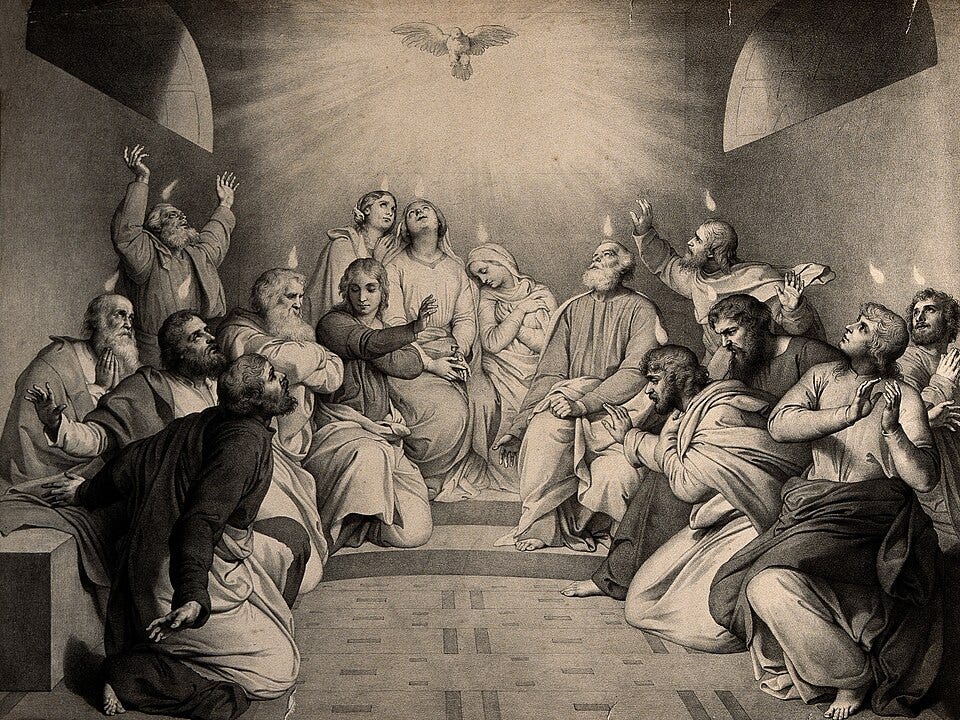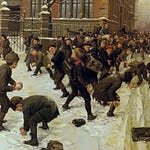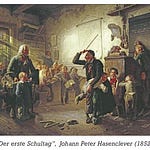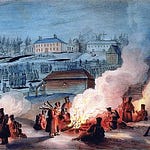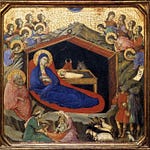Once upon a time, there were some fish in a frying pan, getting fried alive in olive oil. “Brothers, let’s get out of here,” one of them cried out, “or we’re cooked for sure!” So they all jumped out of the frying pan, and fell right into a fire of burning coals. That hurt much worse, so all the fish condemned the advice, saying, “Dying this way’s going to be a heck of a lot more horrible!” The fable warns us, says the author, “that when we try to avoid the troubles that are right before us, we often end up stumbling into even worse.” The author was an Italian man of letters named Lorenzo Bevilacqua, which means Lawrence Drinkwater, but as a pun-in-reverse he called himself, in Latin, Laurentius Abstemius, meaning Lawrence the Teetotaler. This little fable is in a big book of fables, two hundred of them translated from Aesop’s Greek, and then quite a few ginned up by Lorenzo himself, including this one. That was in 1495, but apparently the book got around, and certainly the saying did — it’s the origin of the English saying, “Out of the frying pan, into the fire,” playing upon our Word of the Week, fire.
At least we can make a good guess that that’s the source, because we find Thomas More using the saying shortly afterwards in 1532, writing against William Tyndale, who had insisted that only the words of Scripture were authoritative, so that when More brought out the words of Jesus, that there were some things that would not be revealed to his disciples until the Holy Spirit came to teach them, More said that Tyndale had “featly conveyed himself out of the frying pan fair into the fire.” I’m not sure how perfectly it applies, but you might stretch the saying a little and apply it to both More and Tyndale, not because they were foolish and impatient, but because they were single-minded and brave, though enemies. More would not go along with King Henry VIII’s annulment of his marriage to Catherine of Aragon, because there were no grounds for it, and the Pope had disallowed it, and Tyndale wouldn’t, either, because he said it violated Scripture. Henry had More executed, and as for Tyndale, he fled from England, where he was caught in the Netherlands by the men of the emperor, Charles V, and executed in turn. Or maybe it was Henry who was the big fish in the frying pan. Catherine was a good, loyal, pious, and devoted wife; Henry sent her packing, which did not at all please her nephew, that same emperor Charles; and he took Anne Boleyn, his longtime mistress, as his new wife. She lasted three years, and then she too met the chopping block.
Oh, there are all kinds of phrases we associate with fire, that dangerous friend to man: fire sale, where’s the fire?, playing with fire, rapid-fire, fire drill (which was originally an actual drill, kindling fire from friction against twisted sticks). Maybe the most interesting of them all is Saint Elmo’s fire, named for Saint Erasmus (Elmo), the patron saint of sailors. It’s a bluish glow, sometimes crackling to the ear, that gathers on the bow of a ship or the end of its booms or up and down the masts and shrouds — a blue or violet electric glow, from ionized particles in the air, not dangerous, but mysterious, for sure. Sailors welcomed it as a sign of good luck, though it usually preceded a thunderstorm. Airplane pilots are used to it, and I think I’ve seen it once or twice myself, as a passenger. In Welsh it’s called y canwyll yr Ysbryd Glan, a lovely phrase that suits us well on this day after Pentecost: the candle of the Holy Spirit.
Saint Elmo’s fire isn’t the same as the ignis fatuus, the foolish fire, that you may see over swamps and bogs and other places full of slowly decaying organic matter. That light comes from a couple of compounds of phosphorus. If you follow it, you might end up in trouble; so the Germans called it der Irrlicht, the Stray-light. Milton compares Satan, using the serpent as his vehicle to lead Eve to the fateful tree, to this same “wandering fire,” which, “hovering and blazing with delusive light / Misleads the amazed night-wanderer from his way, / To bogs and mires.” Don’t follow that will-o’-the-wisp!
When I was a boy, my favorite scene from literature that had fire in it came from The Jungle Book, by Rudyard Kipling, and if you parents and grandparents aren’t reading Kipling to the kids, you’re missing some great delight! Anyway, what separates man from the beasts is not just intelligence, but a kind of cleverness and courage that sets the beasts in awe: it is his use of fire, of which all the animals are afraid, even the wise and fearless panther Bagheera. Mowgli will use fire, if I remember, to get the sly and malignant tiger Shere Khan into the straits that will prove to be his death. But don’t we all find fire to be delightful, when it’s controlled, and even if it’s big? Think of the wonderful word bonfire, long taken to be a compound of French bon, good, and English fire, though that etymology is now disputed; the alternative is that it was a bone-fire. Anyway, what American doesn’t have memories of sitting around an outdoor fire, and toasting marshmallows on a stick? I liked them best when they were black on one end and brown over all the rest. Meanwhile, I think we can tell that man's best friend has been with him for many thousands of years, just because the faithful dog seems so comfortable around the fire in the home or out in the yard.
Just a little on the word: Grimm’s Law tells us, among other things, to associate Indo-European p with Germanic f, and that’s why the root that gives us Greek pyr — as in the borrowed or coined English words pyre, pyrotechnics, pyromaniac — gives us Anglo-Saxon fyr, ancestor of our noun fire. In German it’s Feuer, and the words are similar in all the Germanic languages. There was another root for fire, among our Indo-European ancestors, one for fire as a living creature: it gave us Latin ignis, fire, and Hindi agni, fire, and also Agni, the god of fire. Only in the crazy all-borrowing world of English can you ignite a fire, putting the two roots together in an ordinary phrase. Just don’t do it in the middle of a swamp!



